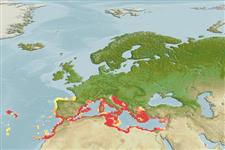Common names from other countries
Classification / Names / Names
Common names | Synonyms | Catalog of Fishes (gen., sp.) | ITIS | CoL | WoRMS
Environment: milieu / climate zone / depth range / distribution range
Ecology
Benthic; depth range 0 - 500 m (Ref. 356), usually 0 - 30 m (Ref. 437). Subtropical, preferred 20°C (Ref. 107945); 45°N - 28°S, 29°W - 36°E
Eastern Atlantic and Mediterranean Sea: from Portugal to Canary Islands, Azores Island then east to Lebanon.
Length at first maturity / Size / Weight / Age
Maturity: Lm ?, range 5 - 6 cm Max length : 25.0 cm SHL male/unsexed; (Ref. 356); common length : 10.0 cm SHL male/unsexed; (Ref. 437)
Life cycle and mating behavior
Maturity | Reproduction | Spawning | Eggs | Fecundity | Larvae
Life cycle: Embryos develop into free-swimming trocophore larvae, succeeded by the bivalve veliger, resembling a miniature clam (Ref. 833).
SAUP Database. 2006. (Ref. 356)
IUCN Red List Status (Ref. 130435)
CITES status (Ref. 108899)
Not Evaluated
Not Evaluated
Human uses
Fisheries: commercial
FAO - Fisheries: landings | FishSource | Sea Around Us
Tools
Internet sources
Estimates based on models
Preferred temperature
(Ref.
115969): 15.9 - 21.6, mean 18.7 (based on 220 cells).
Prior r = 0.43, 95% CL = 0.29 - 0.65, Based on 1 full stock assessment.
Vulnerability
Low vulnerability (15 of 100).
